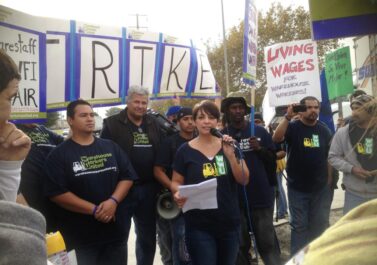Comrades wrote this questionnaire for a call centre-inquiry. We have not changed it much, even though the interviews have shown that it is too long. It hast helped to formulate the important question more precisely, to understand the organisation of work, the machinery, the co-operation…
For further projects of inquiry it has to be adjusted to the area (factory, construction, university, housework etc.). It can be a first step to collect facts and get an overview. Here it is:
Company
1. Which company do you work for?
2. To what sector does the company belong?
3. To which bigger trust does the company belong?
4. What is produced there or what kind of services are offered?
5. What function does the call centre have in the company?
6. In which call centre department are you working?
7. What other call centre departments are there in the company?
8. When was the call centre set up?
9. Did the company get state subsidies?
10. How many people are working altogether at the location or for the company?
11. Is the call centre out-sourced or has it just been set up?
12. Were already existing call centre joined together?
13. What has changed through that, concerning work conditions?
14. Was the same work you are doing in the call centre done in other ways before?
15. Which work routines or technologies have changed through the set up of the call centre?
16. Why do you think does this call centre exists?
17. What explanation does the management give on the question of why the call centre exists?
Region
18. Are there many call centre in your region?
19. What sectors do they operate in?
20. Why are they concentrated in your region?
21. What do managers or politicians say about this?
22. Is there a training scheme for call centre agents offered in your region?
23. Who offers these schemes?
24. Is the state employment office or social service agency putting pressure on people to work in call centre or take part in the training scheme?
Workers
25. How many people work in the call centre?
26. How many are female, how many are male?
27. How many immigrants work there?
28. Where do they come from?
29. How many are part-time workers, how many are full-time?
30. Has the proportion of part-timers and full-timers changed?
31. What various working time models exist there?
32. In your opinion, what kind of people start working in call centre?
33. Why do they start working there?
34. Do you think people in the call centre come from similar backgrounds and get along well, or do they differ from each other very much?
Job or profession
35. How long have you / the others worked there so far?
36. Did you / the others already work in other call centres?
37. Why did you / the others stop working there?
38. What did you / the others do or where did you work before that?
39. How did you find the call centre job?
40. Why did you / the others apply for the call centre job?
41. Do you / the others want to work there for a long time?
42. Do you want to have another job within the call centre? Which one and why?
Qualification
43. What criteria did the management apply when hiring people?
44. What kind of job training or skill did you have before?
45. Does the management organise training to qualify workers?
46. How long does this training last?
47. What is taught or what have you learned there?
48. What do you think about the training now, where you are working?
49. Did you have the necessary skills before or did you learn them ‘on the job’, while working at the Call Centre?
50. In your opinion, which skills does a call centre worker need?
Methods of working
51. When working on the telephone, which actions do you perform?
52. Who is giving you direct orders?
53. Apart from those, who has a position superior to you?
54. With which technical devices are you working?
55. Which functions do these devices have?
56. Can you operate the devices properly?
57. Do you like working with the devices?
58. What do you like about this work in general?
59. What do you dislike about it?
Co-operation
60. Are you working together, co-operatively, with other workers?
61. In what way do you cooperate?
62. Do you have contact with other departments, branches or work sites?
63. Are these contacts important for the work?
64. How do you find the information you need to do your job?
65. Are you dealing with a call on you own or do you also put calls through to other departments?
Problems with the organisation of work
66. What kind of problems come up frequently concerning the organisation of work?
67. Are there frequent failures of the technical equipment?
68. If so, when there are problems, how do you deal with them?
69. What role does co-operation with your colleagues have in this context?
70. What role do the managers and supervisors have?
71. Is it enough to follow the official work routines in order to manage the work, or do you also have to fulfil other functions as well?
72. Have you been given additional work since you began?
73. How did you react to that?
74. In your opinion, who is organizing the work?
75. Is the organization of the work sensible?
76. Why not?
77. Why are there managers and supervisors?
78. In your opinion, why are there so many workers in one office in call centre?
Work intensity
79. How or what is determining the pace of work?
80. At what rhythm are you being called or are you calling up?
81. Is the rhythm of the calls and your work speed determined by the telephone equipment?
82. Is the rhythm of calls leaving you time for talking to colleagues about other things?
83. What do you talk with them about?
84. How do you manage to make the work easier or to have unofficial breaks?
85. Do you think the job is stressful? What exactly is stressful about it?
86. How do you feel after a working day?
Control
87. Are you being controlled and how?
88. Who is controlling you?
89. Why are you being controlled?
90. Which criteria are being used in controlling you (amount of calls, duration, etc.)?
91. What happens if you are making serious mistakes or if you are not following orders?
92. Does that happen often?
93. Are you managing to get around the controls?
94. Does it happen that people do something wrong deliberately in order to have breaks or fool the supervisor?
Wage
95. How much do you earn?
96. Does everybody earn the same?
97. Why not?
98. Is there a wage scale or are there wage groups?
99. What criteria are used to get a pay raise?
100. Does the wage depend on performance?
101. Are you getting additional payments for certain working hours (at night, on weekends…)?
102. How does management justify the wage differences?
103. What do your colleagues have to say concerning wages?
Working hours
104. What does your contract say about your working hours?
105. Are you working overtime, special shifts, etc.?
106. How long does it take to get to work and back home?
107. What time does the Call Centre open and close daily and how long do people call up?
108. Is the Call Centre open on Saturday, Sunday and public holidays?
109. What kind of shift patterns exist (e.g., variable shifts or always on early / night shift etc.)?
110. How is the shift schedule made?
111. Do you have a say in the matter?
112. Are there work time accounts where you can (are forced to) accumulate working hours and take time off later?
113. When do you have breaks?
114. Do the workers have breaks together?
115. Do you have additional breaks due to the fact that you are working in front of computer screens?
116. How many days holiday do you have?
117. Are you satisfied with the working hours, the shift system etc.?
118. What is not satisfying to you about all that?
Unions
119. Is there a negotiated collective agreement?
120. Does that cover only the location, the whole company or the sector?
121. What exactly is regulated there?
122. Who has signed it with management?
123. Is there a works council (official worker representation body on the company level)?
124. What is it doing?
125. Which union is active within the call centre?
126. What is it doing?
127. What do you / the other workers think about the union and/or the works council?
128. What do you expect of the union or the works council?
Services
129. What exactly is your service?
130. Why is this service getting ‘produced’?
131. Who has an interest in it?
132. What significance does friendliness, customer oriented service etc. have?
133. Do you consider your job as necessary for society?
134. What does the management have to say about that?
135. What do the other workers say about that?
Conflicts
136. While working, do you talk a lot about the problems in the call centre?
137. What are you talking about exactly?
138. Are / were there conflicts among the workers?
139. What was the problem and what happened?
140. Are / were there any bigger conflicts with the management?
141. What happened exactly?
142. Will there be (more) conflicts around the situation on the job?
143. Have you already been threatened with out-sourcing or closure of the call centre?
144. What do you think about this threat?
Discussion
145. What is the difference between work in a call centre and work in a factory, other offices or in a hospital?
146. In the future, will more people work under conditions similar to call centres?
147. Will there still be Call Centres in a few years?
148. What will change about the work conditions?
149. How do you imagine work and life will be in ten or twenty years?
150. Who will determine how the situation will be in ten or twenty years?
151. What do you think about the possibility of organising with other people for an improvement of the situation?
152. With whom would you organise?
153. What could you do to put through your demands?
154. What do you want to put through or change?
Questionnaire
155. What do you think about this questionnaire?
156. How can it be improved?



